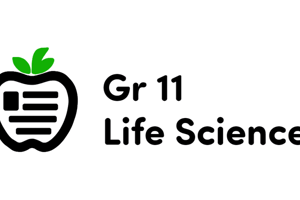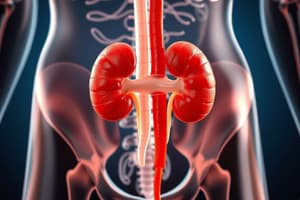Podcast
Questions and Answers
Which of the following is NOT an excretory product?
Which of the following is NOT an excretory product?
- Carbon dioxide
- Hormones (correct)
- Bile
- Urea
What is the primary function of the lymphatic system in transportation?
What is the primary function of the lymphatic system in transportation?
- Transport of oxygen and nutrients
- Transport of hormones and proteins
- Transport of waste products
- Transport of immune cells and fats (correct)
Which nutrient type is primarily used for energy storage?
Which nutrient type is primarily used for energy storage?
- Fats (correct)
- Vitamins and minerals
- Carbohydrates
- Proteins
What is the primary site of gas exchange in the respiratory system?
What is the primary site of gas exchange in the respiratory system?
What is the process of removing waste and excess substances from the body?
What is the process of removing waste and excess substances from the body?
Which of the following organs is involved in detoxifying and converting toxins into waste?
Which of the following organs is involved in detoxifying and converting toxins into waste?
What is the process of obtaining and utilizing energy and nutrients?
What is the process of obtaining and utilizing energy and nutrients?
What is the process of exchanging oxygen and carbon dioxide?
What is the process of exchanging oxygen and carbon dioxide?
Flashcards are hidden until you start studying
Study Notes
Life Processes
Excretion
- Definition: The process of removing waste and excess substances from the body
- Importance: Maintains homeostasis, prevents toxin buildup, and regulates electrolyte balance
- Organs involved:
- Kidneys: filter waste and excess substances from blood
- Liver: detoxifies and converts toxins into waste
- Skin: removes waste through sweat
- Lungs: removes carbon dioxide
- Intestines: absorbs nutrients and eliminates waste
- Excretory products:
- Urine
- Feces
- Carbon dioxide
- Sweat
Transportation
- Definition: The process of moving substances within the body
- Importance: Supplies oxygen and nutrients to cells, removes waste products
- Transportation systems:
- Circulatory system (blood vessels, heart): transports oxygen, nutrients, and hormones
- Lymphatic system: transports immune cells, fats, and proteins
- Nervous system: transmits signals and coordinates body functions
- Modes of transportation:
- Blood circulation
- Lymphatic circulation
- Diffusion (cell membrane)
- Osmosis (water transport)
Nutrition
- Definition: The process of obtaining and utilizing energy and nutrients
- Importance: Provides energy, builds and repairs tissues, and maintains health
- Nutrient types:
- Carbohydrates (energy source)
- Proteins (building blocks)
- Fats (energy storage)
- Vitamins and minerals (regulate metabolism)
- Nutrient uptake:
- Ingestion (eating)
- Digestion (breaking down nutrients)
- Absorption (into bloodstream)
- Assimilation (utilization by cells)
Respiration
- Definition: The process of exchanging oxygen and carbon dioxide
- Importance: Provides energy, maintains pH balance, and regulates oxygen levels
- Respiratory system:
- Nose and mouth: air entry points
- Trachea: airway
- Bronchi and bronchioles: air tubes
- Alveoli: gas exchange site
- Respiratory process:
- Inspiration (inhalation): oxygen entry
- Expiration (exhalation): carbon dioxide removal
- External respiration (breathing)
- Internal respiration (cellular respiration)
Life Processes
Excretion
- Removes waste and excess substances from the body to maintain homeostasis
- Prevents toxin buildup and regulates electrolyte balance
- Kidneys filter waste and excess substances from blood
- Liver detoxifies and converts toxins into waste
- Skin removes waste through sweat
- Lungs remove carbon dioxide
- Intestines absorb nutrients and eliminate waste
- Excretory products include urine, feces, carbon dioxide, and sweat
Transportation
- Moves substances within the body to supply oxygen and nutrients to cells and remove waste products
- Circulatory system transports oxygen, nutrients, and hormones through blood vessels and the heart
- Lymphatic system transports immune cells, fats, and proteins
- Nervous system transmits signals and coordinates body functions
- Modes of transportation include blood circulation, lymphatic circulation, diffusion, and osmosis
Nutrition
- Obtains and utilizes energy and nutrients to provide energy, build and repair tissues, and maintain health
- Carbohydrates are energy sources
- Proteins are building blocks
- Fats are energy storage
- Vitamins and minerals regulate metabolism
- Nutrient uptake involves ingestion, digestion, absorption, and assimilation
Respiration
- Exchanges oxygen and carbon dioxide to provide energy, maintain pH balance, and regulate oxygen levels
- Respiratory system includes nose and mouth, trachea, bronchi and bronchioles, and alveoli
- Inspiration (inhalation) brings oxygen into the body
- Expiration (exhalation) removes carbon dioxide
- External respiration involves breathing
- Internal respiration involves cellular respiration
Studying That Suits You
Use AI to generate personalized quizzes and flashcards to suit your learning preferences.




